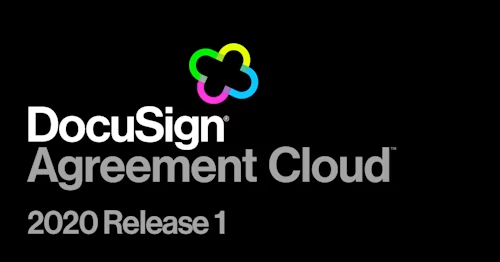
Docusign presenta el Agreement Cloud 2020 Release 1
Conoce las novedades del Docusign Agreement Cloud 2020 Release 1, el programa de anuncio de nuevos productos y características de nuestra tecnología.


Hoy vamos a lanzar el Docusign Agreement Cloud 2020 Release 1, que anteriormente se denominaba "Docusign Spring ‘20 Release".
En esta versión, hemos centrado en mejoras y características solicitadas por nuestros clientes para productos lanzados recientemente que forman parte del Docusign Agreement Cloud.
Este es el primero de los tres anuncios de este año en el nuevo programa Docusign Agreement Cloud Releases. Este programa anuncia nuevos productos y características para que los clientes puedan conocer y disfrutar de estas nuevas capacidades.
Estos anuncios se suman a las release notes (notas de lanzamiento) y a las newsletters de actualización de productos, que detallan todas las innovaciones, mejoras y correcciones de errores lanzadas mensualmente o según sea necesario.
Sabe más sobre la versión 1 a continuación.
Lanzamiendo del Agreement Cloud Editor
La generación de documentos es uno de los primeros pasos para preparar un acuerdo para la firma. Sin embargo, de acuerdo con el informe de Docusign, 2019 State of Contract Management, el 94% de las personas dicen que el error humano afecta el proceso del contrato.
Es por eso que lanzamos Docusign Gen para Salesforce y Docusign Negotiate para Salesforce el año pasado, ayudando a automatizar este paso esencial, y más, en el proceso del acuerdo. Pero no nos detendremos allí.
El primer paso para automatizar la generación de acuerdos es la creación de plantillas, que, sin la experiencia adecuada, puede ser un proceso lento y propenso a errores.
Conoce el Agreement Cloud Editor, una nueva forma de crear plantillas de acuerdos.
El Agreement Cloud Editor te permite arrastrar y soltar campos de datos de Salesforce y asignar contenido condicional al flujo del texto de la plantilla. También puedes alternar entre la plantilla y una vista previa en vivo con datos combinados, lo que facilita ver qué ediciones deben realizarse.
Los documentos generados son responsivos, por lo que se adaptan automáticamente al tamaño y la orientación de visualización del dispositivo móvil. El Agreement Cloud Editor está dispnible inicialmente en Docusign Gen para Salesforce, todavía, luego estará disponible en otros productos Docusign, y con aún más capacidades.
Mejoras del Docusign Click
El año pasado, lanzamos el Docusign Click, nuestra solución de captura del consentimiento del cliente a los términos del acuerdo estándar conocidos como "clickwraps" (es decir, términos y condiciones, acuerdos de licencia de usuario final y divulgaciones).
Con Click, puedes capturar el consentimiento de tus clientes de manera fácil y segura con un sólo clic en una casilla de verificación o botón incrustado en tus sitios web o aplicaciones móviles. Click es capaz de mantener un seguimiento de auditoría completo y ofrecer soporte a versiones, que son diferenciadores clave de otras soluciones. Así, ayuda a los clientes a reducir el riesgo de incumplimiento de ESIGN, eIDAS y otras regulaciones legales.
Para hacer Click aún mejor, lanzamos varias mejoras basadas en los comentarios de los clientes. Por ejemplo, ahora puedes:
Registrar las respuestas de "rechazo/exclusión", que han sido una de las principales solicitudes de los clientes para cumplir con los requisitos del GDPR en Europa;
Personalizar la declaración del acuerdo sobre el botón "aceptar", brindando más flexibilidad y control a los clientes que deben usar un lenguaje legal específico;
Admitir múltiples acuerdos, lo cual es valioso para los clientes que desean agrupar varios términos estándar en un sólo clickwrap para una experiencia del cliente perfecta (es decir, agrupar términos y condiciones, política de privacidad y divulgación);
Exportar las respuestas a un archivo CSV, lo que facilita la búsqueda, el análisis y el informe de los datos de clickwrap.
ID Evidence
Al abrir una cuenta bancaria o incorporar nuevos empleados, las empresas a menudo necesitan verificar la identidad de la persona que firma o ingresa datos electrónicamente.
Es por eso que lanzamos el Docusign ID Verification el año pasado, que verifica automáticamente la identificación emitida por el gobierno del firmante o el eID europeo en cualquier dispositivo, en cualquier lugar, para una finalización del acuerdo más rápida, fácil y segura.
Si bien cientos de clientes ya ven el valor de la Verificación de ID hoy, los clientes en industrias reguladas tenían un requisito adicional: almacenar una copia de la ID o extraer datos de los documentos de ID.
Por ejemplo, los servicios financieros y los clientes bancarios necesitan copias para cumplir con los requisitos de Know Your Customer o contra el lavado de dinero. Con ID Evidence, puedes capturar información del documento de identificación (para Mexico la Credencial para votar), y conservar una copia de la identificación para respaldar los requisitos de cumplimiento.
Mediante las API, la información de identificación también se puede extraer y almacenar en un sistema de registro u otro sistema de negocios de elección.
Expansión de Docusign Payments
Por último, pero no menos importante, nos complace anunciar nuevas actualizaciones de Docusign Payments.
Desde su lanzamiento hace dos años, Payments ha ayudado a los clientes a procesar más de US$100 millones en pagos únicos, como depósitos de alquiler y donaciones, así como pagos recurrentes y futuros cargos únicos, incluidas las cuotas mensuales y los cargos por pagos atrasados.
Debido a la demanda global de los clientes, son aceptados pagos en todos los países y monedas admitidos por cada socio: Stripe, CyberSource (aceptados en Mexico), Braintree, Authorize.net y Zuora. En estos proveedores de pagos, tenemos más de 35 países y 135 monedas cubiertas. (Gol de admitir Stripe en todas las monedas y países en abril. Gol de admitir todos los demás proveedores de gateway en mayo).
Esperamos que disfrutes de las nuevas capacidades en Docusign Agreement Cloud: 2020 Release 1. Consulta las release notes. Para obtener más detalles de los lanzamientos, habla con un experto.
Publicaciones relacionadas
Docusign IAM: la plataforma de acuerdos que tu negocio necesita




